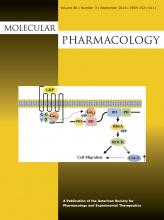Abstract
Gastrin-releasing peptide receptor (GRPR) is ectopically expressed in over 60% of colon cancers. GRPR expression has been correlated with increased colon cancer cell migration. However, the signaling pathway by which GRPR activation leads to increased cancer cell migration is not well understood. We set out to molecularly dissect the GRPR signaling pathways that control colon cancer cell migration through regulation of small GTPase RhoA. Our results show that GRP stimulation activates RhoA predominantly through G13 heterotrimeric G-protein signaling. We also demonstrate that postsynaptic density 95/disk-large/ZO-1 (PDZ)-RhoGEF (PRG), a member of regulator of G-protein signaling (RGS)-homology domain (RH) containing guanine nucleotide exchange factors (RH-RhoGEFs), is the predominant activator of RhoA downstream of GRPR. We found that PRG is required for GRP-stimulated colon cancer cell migration, through activation of RhoA–Rho-associated kinase (ROCK) signaling axis. In addition, PRG-RhoA-ROCK pathway also contributes to cyclo-oxygenase isoform 2 (Cox-2) expression. Increased Cox-2 expression is correlated with increased production of prostaglandin-E2 (PGE2), and Cox-2-PGE2 signaling contributes to total GRPR-mediated cancer cell migration. Our analysis reveals that PRG is overexpressed in colon cancer cell lines. Overall, our results have uncovered a key mechanism for GRPR-regulated colon cancer cell migration through the Gα13-PRG-RhoA-ROCK pathway.
Footnotes
- Received May 19, 2014.
- Accepted June 13, 2014.
A.K. and T. Kozasa contributed equally to this work as co-corresponding senior authors.
- Copyright © 2014 by The American Society for Pharmacology and Experimental Therapeutics
MolPharm articles become freely available 12 months after publication, and remain freely available for 5 years.Non-open access articles that fall outside this five year window are available only to institutional subscribers and current ASPET members, or through the article purchase feature at the bottom of the page.
|






